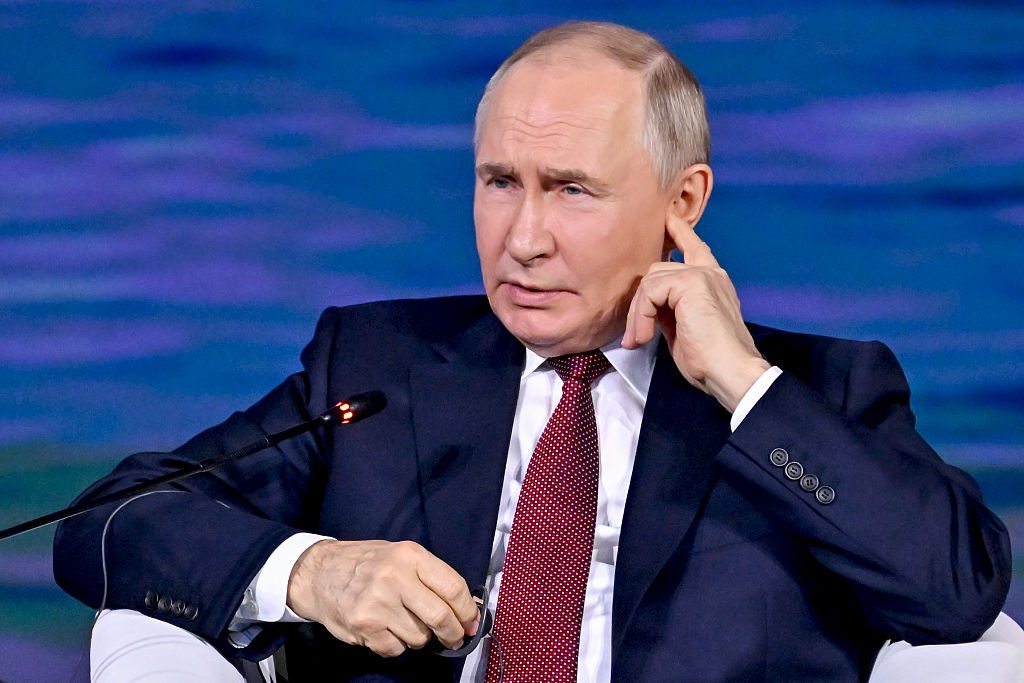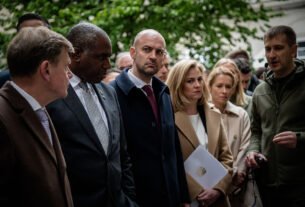Konstantin Eggert is a Russian-born journalist with DW, Germany’s international broadcaster. He is based in Vilnius and was previously editor-in-chief of the BBC Russian Service Moscow bureau.
There are three impressions that stuck in my mind having watched broadcasts from Washington on Monday. To start with, Volodymyr Zelenskyy looked almost at home there, as opposed to the disastrous February visit. The European leaders also looked (and spoke) as if they finally understood – their common interest in containing and pushing back against Russia does not depend on who sits in the White House. And thirdly, Donald Trump never once called the Europeans “allies”, as any other US president before (and, hopefully, after him) would – especially in such circumstances.
But in spite of this, the Transatlantic alliance seems to still hold, even if with difficulty.
The first impression is actually closely linked to a second one: The Ukrainian president no doubt felt reassured by the presence of the Europeans. He also seems to have understood that in modern-day Washington ‘money talks’ like never before in living memory. His offer to buy $100 billion-worth of American arms (ostensibly with Europe’s blessing and financing) is a smart step that chimes in well with Trump’s policy of “no freeloading”, even by America’s friends.
And the US president seems to have appreciated this. But even bearing in mind his unpredictability and quick temper, the idea that he can throw Zelenskyy and Ukraine under Putin’s bus with impunity is a fantasy. Always was. In spite of its reliance on Western help, Ukraine remains sovereign. Come to think of it, today it is more of a traditional nation state than some of the EU countries. This author, who first travelled to Kyiv in 1991 and continues to do so, can attest to this.
Ukrainian society, although tired, will not accept “peace at any price’. Simply because a much better surrender protocol could have been signed with Vladimir Putin in 2021 or 2022, without so much death and suffering. Zelenskyy knows it too. His historical legacy – and possible political future – depends on giving Russia a good political and diplomatic fight before accepting any deal. If he does not, he’d rather not return to Kyiv from Istanbul, Geneva, Malta or wherever the future peace talks may be held.
And by the way, he may never have to go there in the first place. At least, in the immediate future.
If one looks at Putin’s behaviour, there is nothing in it that says he is ready for such talks. His insulting offer to meet Zelenskyy in Moscow, if true, belies his ultimate goal – to sabotage the peace effort and blame it all on the Ukrainian leadership.
24 hours before the Washington talks, the Kremlin started rolling out new conditions to Kyiv and the West: giving the Russian language in Ukraine an official status (which means changing the Ukrainian constitution); restoring full rights to the Russian Orthodox Church (which Ukraine sees as an instrument of Russia’s not-so-soft power); reiterating territorial claims; and finally, that no troops from NATO counties are deployed to Ukraine in the framework of security guarantees (this one is old). No side that wants to move towards the real deal would engage in such behaviour.
Putin’s main goal did not change. It is not so much a full-scale occupation of Ukraine – although he wants to keep what he got already. The aim is to put Ukraine under Moscow’s full political control and limit its sovereignty, most probably by gradually promoting and installing in Kyiv a pliant administration that will forsake the goals of EU and NATO membership.
He sincerely thinks that his economy can withstand more sanctions (with the help of China), that he still has enough Russians prepared to kill Ukrainians for money, and that Russia’s demographic edge over Ukraine will bring him victory – with a bit of luck and patience.
Putin’s other goal is old and well-verified: to undermine the West. He wants to sow discord among Ukraine’s allies, buy himself time to increase military production and find new ways and partners to game the sanctions regime. All this plus proving to Russia’s international allies on the right and left, plus the so-called “global South”, that Ukraine and its supporters are in the wrong and “his” Russia is in the right.
Putin does not want peace talks. But talks about talks suit him just fine.





